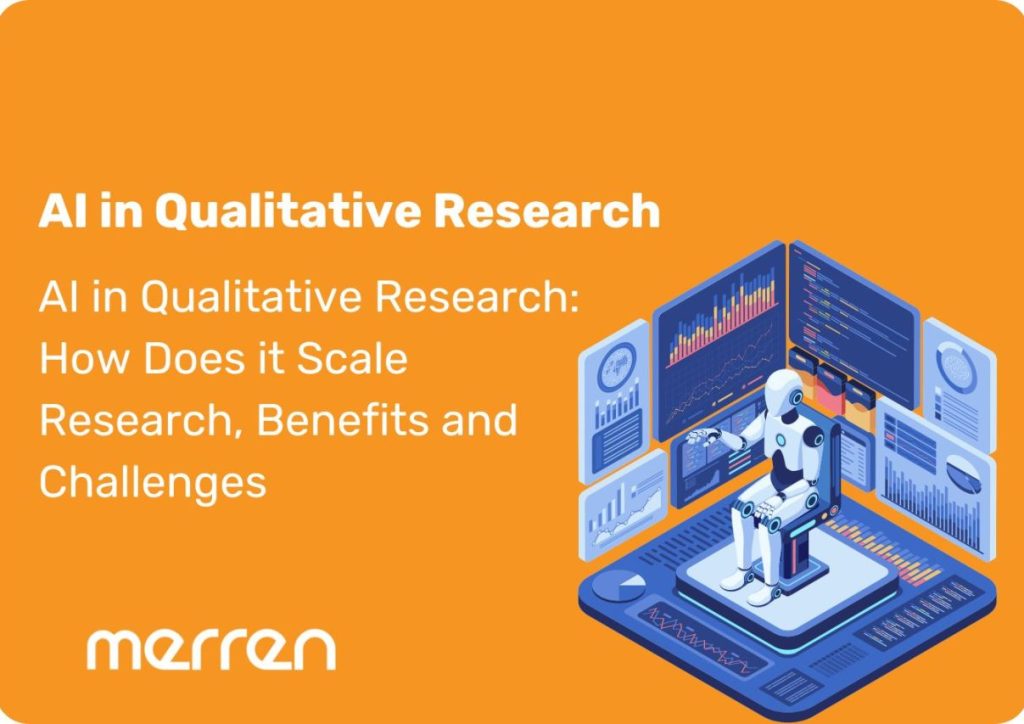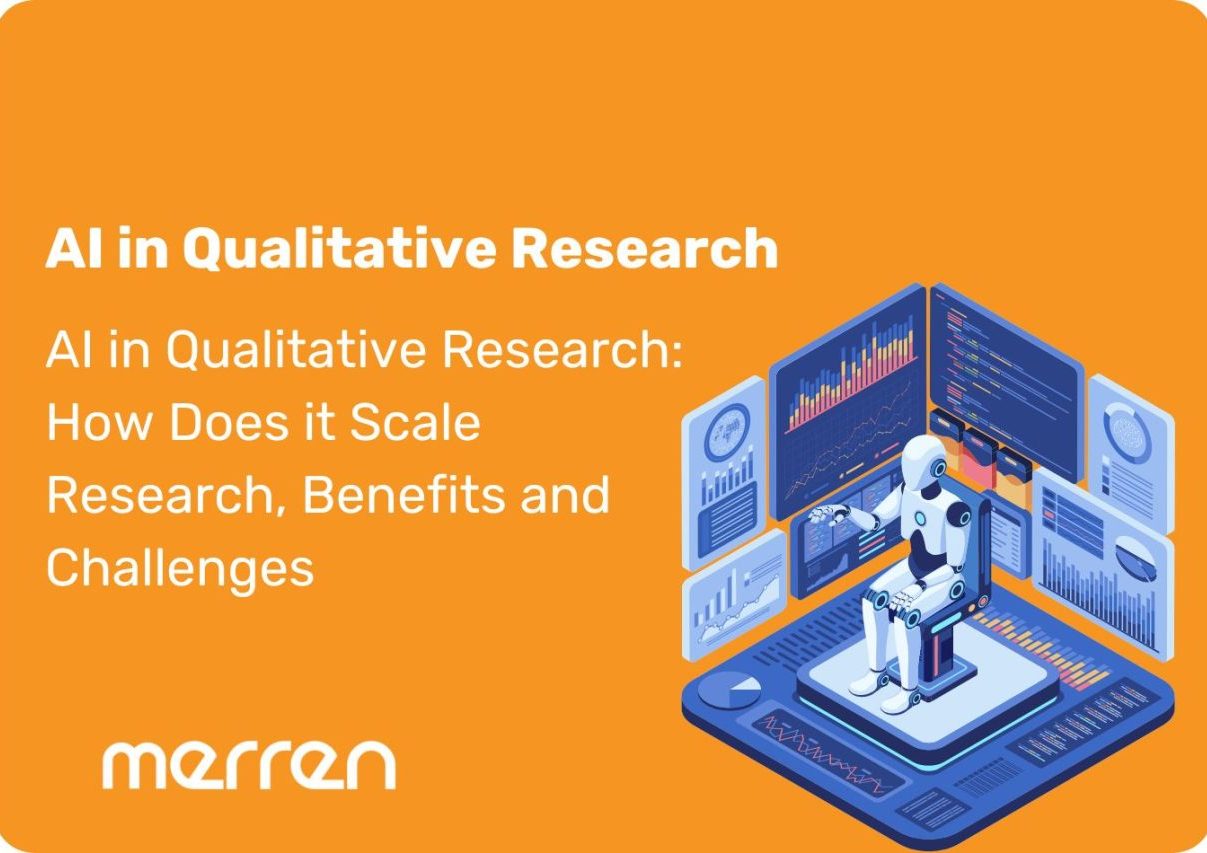AI in qualitative research is making workflows faster, more scalable, and richly informative all while preserving human nuance. The AI tools enable researchers from study design, survey target respondents to automated reporting. In this blog we will discuss how artificial intelligence in quantitative research can help marketers, CX professionals and researchers.
What is AI in Qualitative Research?
AI in qualitative research is the use of artificial intelligence tools and algorithms to collect, process, and analyze non-numerical data such as interviews, open-ended survey responses, audio, or video recordings. These technologies can identify themes, detect sentiment, and patterns faster and more accurately than manual methods. In turn, researchers generate deeper insights with less time and effort.
Benefits of using AI in qualitative research
Here are the benefits of using AI in qualitative research:
- Faster data processing – AI can analyze large volumes of qualitative data in minutes instead of weeks.Merren’s AI capabilities can generate reports in hours instead of batch processing data.
- Enhanced accuracy – Reduces human bias and brings consistent interpretation of responses.
- Deeper insights – Detects subtle patterns, emotions, and themes that might be missed in manual analysis.
- Scalability – Handles massive datasets across multiple sources and formats without loss of quality.
- Real-time analysis – Delivers insights instantly, enabling quicker decision-making.
- Cost efficiency – Cuts down on the time and manpower needed for manual coding and analysis. However, look at AI as an integration rather than a complete replacement. AI integrated in research methods can aid human researchers streamline data analysis.
- Multi-format compatibility – Works with text, audio, video, and image-based qualitative data.
- Predictive capabilities – Uses machine learning to forecast trends and customer behaviors.
How AI Elevates Every Stage of Qualitative Research
1. AI discussion guide creation
Well-designed discussion guides can enable researchers to obtain the context and goal of the research. This is the foundation. AI tools analyze your research objectives and even market context to auto-generate specific questions. In this manner, you can get questions that directly probe about an experience or situation. This reduces planning time.
2. AI moderation & interviewing
Live sessions are resource-intensive. With AI interviewers, moderation becomes smarter: questions evolve dynamically. AI moderation co-pilots suggest probes in real time and it is interactive, effective and creates questions that are in line with responses.
3. Real-time transcription & sentiment recognition
AI transcription tools convert audio into text instantly using speech to text analysis. It detects sentiments across multiple responses and segregates it into three popular sentiments: frustration metrics, sadness or happiness metrics. This speeds up workflows and helps you identify themes and quotes as they emerge.
4. AI thematic analysis & coding
AI thematic analysis tools identify patterns, classify responses, and surface nuances that may slip past manual coding saving time and preserving research fidelity.
5. Automated report generating capacity
Automated report generating capacity can build instant reports in hours instead of weeks. Data is critical and it needs to be presented while the market functions in-the-moment. Once analysis is done, automated research reporting delivers executive summaries, sentiment visuals, and highlight quotes instantly for faster stakeholder alignment.
AI in Academic vs. Commercial Qualitative Research
AI is transforming both academic and applied research:
- Research Design: AI aids academics and marketers alike with AI discussion guide creation that adapts to study goals, industry contexts, and respondent profiles.
- Intelligent Moderation: From WhatsApp to Zoom, AI-powered interview tools offer rich, follow-up-aware conversational moderation.
- Transcription to Text Mining: AI transcription tools now handle accents, noise, and multilingual data with emotion-aware processing. Paired with AI thematic analysis, this becomes powerful.
- Adaptive Probing & Follow-Ups: AI moderation co-pilots dynamically adjust questions based on evolving responses and study design.
- Automated Reporting: Both fields benefit from automated research reporting complete with verbatim examples, sentiment heatmaps, and dashboard-ready visuals.
AI in Qualitative Research: Challenges and Ethical Considerations
Data Privacy is paramount. Since AI in qualitative research often uses real voice or text data, protecting privacy via end-to-end encryption, anonymization, and GDPR compliance is essential for trust and integrity.
Algorithmic Bias can skew findings. Tools trained on limited or skewed data can yield unbalanced research outcomes. If an AI moderation co-pilot is biased, it may lead conversations in distorted directions. Addressing this requires diverse training datasets and continuous validation.
Over-Reliance on Automation is a risk. While AI transcription, automated sentiment analysis, and summarization streamline workflows, human oversight remains crucial. Algorithms may miss emotional subtleties or subtle group dynamics—making researcher judgment vital.
AI in Qualitative Research: The Role of AI in the Future
Artificial intelligence in qualitative research shows a promising future. It will streamline mundane and complex tasks using the latest AI tools.
Create smarter AI guide discussion:
Tools may soon generate bias-free, audience-targeted guides using broader data context. It can identify themes, patterns and trends without human intervention. It can create a more balanced and objective view of the audience’s actual perception and needs. Merren’s AI guide probe seeks audio responses to assess themes.
AI moderators in research:
They use NLP to guide interviews and discussion in real time. It will adjust questions in real time according to a participant’s response. This will bring a deeper understanding of areas organically without any rigid script. AI moderators may reduce human bias in follow-up questions making the research more inclusive and neutral. Next-gen AI will interpret tone, hesitation, and sentiment mid-interview, with real-time adjustment.
Qualitative research as analyzed by AI:
It can process large sets of unstructured data such as verbal interview, transcripts, open-ended surveys (audio, video responses) etc. the result is a more objective and data-driven interpretation of qualitative input. Expect multilingual and emotion-detection enhancements for richer data capture.
Instant AI-generated reports:
AI generated reports are detail-oriented. It can break down results as per demographics, sentiment analysis and timeline into visuals like graphs, charts. The extent depends on how complex your data is. NLG-powered reporting tools will deliver tailored narratives on demand helping researchers act in hours, not days.
Conclusion
Artificial intelligence used in qualitative research is in its nascent stage. However, we expect to see an extensive use of AI across platforms that can compile complex verbal data from people- across locations, languages and cultures. Discover more with Merren, an AI-driven customer research platform that needs no-coding to use.


